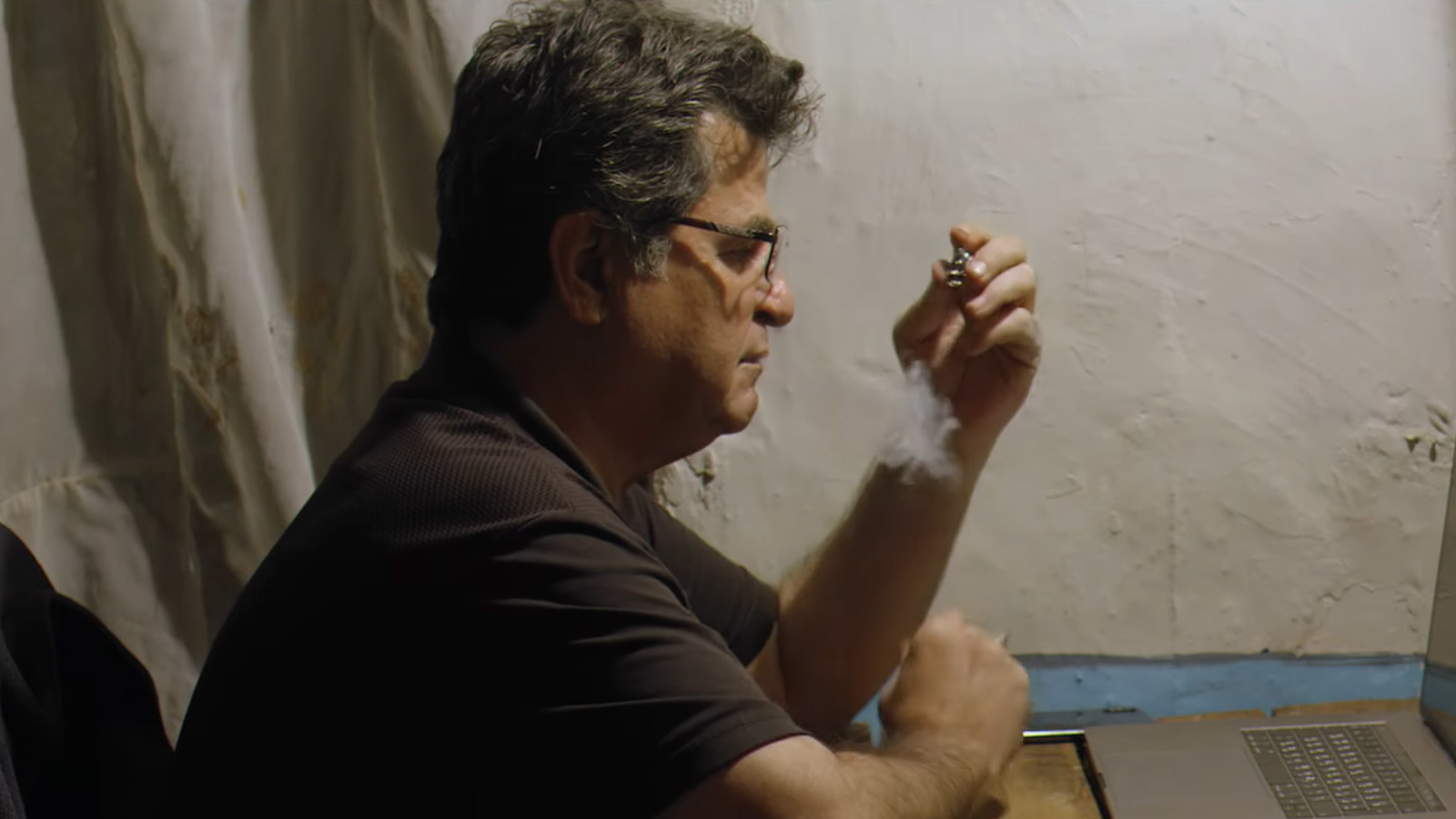Before my recent screening of Crimson Gold, we saw the trailer for Jafar Panahi’s early 21st century masterpiece, No Bears.
It begins with a typed account of the threats and six-year prison sentence the Iranian government imposed on Panahi, followed by his surprise win of the Special Jury Prize at the 79th Venice Film Festival in 2022 for No Bears. Panahi’s previous film, Taxi, a similarly coy docudrama, won the top prize at the Berlin Film Festival in 2015. At that awards ceremony, Panahi’s niece Hana Saeidi held the Golden Bear aloft on stage, tears in her eyes.
Some years ago I wrote decrying the trend of trying to turn cinema culture into ‘activism’. But for Jafar Panahi, I can easily make an exception to that argument. His filmmaking is quite literally an act of activism: a defiant stance in the face of Iran’s totalitarian regime. Perhaps more than any other modern master, he puts himself at risk every single time he picks up a camera. Crimson Gold and No Bears, filmed 20 years apart, show the alteration of Panahi’s political standing in Iran, concurrently with the familiar, frustratingly stagnant sociopolitical pressures choking not only the country’s cinema, but the life chances of its most vulnerable citizens.
Crimson Gold begins with the armed robbery of a jewelry store by Hossein (Hossein Emadeddin), a burly man who quickly becomes disoriented once he realizes he’s not getting out alive. He expresses his final frustrations in full, crying out at himself, smashing the jewels and glass, and finally shooting himself. This is the main character of the movie, and he dies unceremoniously in the first two minutes. His demise, which would ordinarily be treated as a sensationalist and suspenseful plot point, is more like a footnote here.
Hossein makes a meager living delivering pizzas to rich Iranians, most of them living in large flats with private gates. His first night’s delivery goes smoothly, but on the second, an upper-class flat is being staked out by the military police outside, and he’s made to wait. He catches sight of the people inside, having a party. There’s a dichotomy set between private freedom and public persecution in Iranian life–spaces of safety, set against those controlled by regime power. As the party guests trickle out of the party and into the street, they’re accosted by police. Hossein offers slices of pizza to the guests detained outside.
Later, a similar police raid occurs right outside Hossein’s home, with the camera panning from him lying on his bed, to a family being held and pushed by men in uniform outside. Throughout the film, the camera remains a silent observer of political and social relationships. Toward the end, Hossein is welcomed into the mansion suite of one of his delivery customers and accepts his host’s graciousness to indulge in the all finest things that a rich Iranian life has to offer. This sequence is almost wordless. Both Crimson Tide and No Bears are preternaturally quiet, despite being filmed in very public spaces.
The US film critic Jonathan Rosenbaum recounts, of his time in East Berlin: “Before the wall came down, the most disturbing aspect of the bars and cafés I visited was how deadly quiet they all were, with voices seldom rising much above whispers.” Aside from the roars of trucks or motorcycles, there is a quality of feeling both watched and out of place in public spaces in these two films; a familiar feature of autocracy. Hossein by nature is not a talkative character, but through his exasperated facial expressions and eye movements, especially after he feels insulted at the insinuation that he’s too low-class to purchase good jewelry, we can almost hear him screaming on the inside.
No Bears is much more direct about the risks of being seen in public. The change speaks both to the violent changes in Iran’s political reality since the early 2000s, and the danger Panahi himself has faced in recent years.
It’s never made clear whether these events are actually happening or staged productions, and that is specifically the thesis of the film. Panahi continually shows and breaks the reality and the frames of the camera to introduce into the viewers’ minds increasing doubts as to whether what they are watching can be real. The caution required to retrieve a passport; the dangerous condition of a pair of young lovers; the eternal need for secrecy, quiet, and discretion.
These crafty elements of Panahi’s films force us to re-examine the memory, not only of what we’ve just seen, but of what we think we know. Did we hear the voices of a young man and woman? Who’s to say? After much deliberation, Panahi is forced to ask forgiveness and swear to his truth in a traditional village ritual. He asks to record himself and the ritual with a camera. He says that the camera, the film itself, will provide the undeniable truth-to-power of his testimony.
As Chadian director Mahamat Saleh Haroun said in his documentary Bye, Bye, Africa, “People distrust the camera. They can’t see that drama and reality are different.” But in No Bears, Panahi dares us to make the distinction between drama and reality, if we can; to decide who is really in trouble, to decide what we can safely ignore. Near the end of the film, when Bakhtiar and his longtime lover Zara (Mina Kavani) reveal that their passports are totally fake and their route out of Iran and Turkey is fabricated, and when Gozal and Solduz end up dead face down in a pond, bleeding out, we’re forced to contend with these dangerous ambiguities. In the few short years of 21st century, Iran has grown more indecipherable than ever before.






